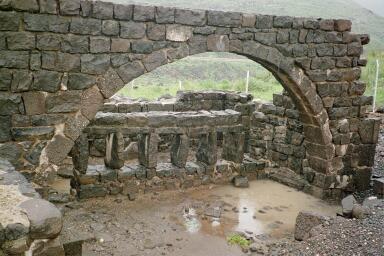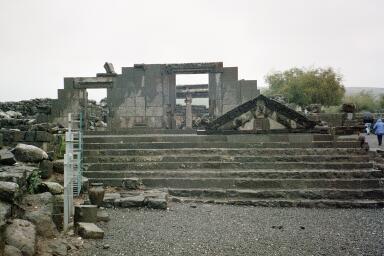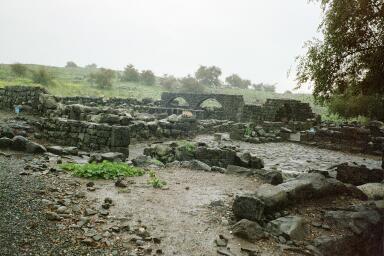Korazim - the Kingdom is Near You
Reading: Luke 10.5-15
We live in an age of replays. Whether it is a faulty sporting tactic, or a disaster on the road or in the air, or an unexpected medical emergency… we revisit it again and again. What went wrong? Could it have been prevented? What special action will prevent it happening again?
 Archaeologists revisit history. Sometimes they look at ruins and can broadly date the architecture or pottery or coins. They try to piece together the story of what might have happened – and why this site is now deserted. But at other times part, at least, of that history is known.
Archaeologists revisit history. Sometimes they look at ruins and can broadly date the architecture or pottery or coins. They try to piece together the story of what might have happened – and why this site is now deserted. But at other times part, at least, of that history is known.
We visited Korazim – known in our English Bibles as Chorazin or Korazin.
The black basalt ruins are some ten kilometres from Capernaum. Archaeologists judge from the arches that some structures date from the Byzantine period. The ruins of a synagogue are there. A showery day and lack of tourists made it a dismal scene for us.
 The historical inter-pretation informed us that this first-century town probably bene-fitted from an influx of Jews following the exile from Jerusalem in 134AD. By the fourth century the town was deserted and in ruins.
The historical inter-pretation informed us that this first-century town probably bene-fitted from an influx of Jews following the exile from Jerusalem in 134AD. By the fourth century the town was deserted and in ruins.
The Bible doesn’t tell us much about what happened in Korazin – but it does say what didn’t happen there!
Jesus was on his way to Jerusalem. He had left Galilee and passed through Samaria. He now sent out seventy-two of his followers. They were an advance party – letting the towns-people know that "the Kingdom of God is near you" (Luke 10.9). In some towns they would be welcome. They were to heal the sick and prepare the way for the coming of Jesus himself.
 But other towns wouldn’t welcome them. They were to wipe the dust off their sandals and leave the town with the clear message that, in spite of their rejection, "the Kingdom of God is near" (v. 11).
But other towns wouldn’t welcome them. They were to wipe the dust off their sandals and leave the town with the clear message that, in spite of their rejection, "the Kingdom of God is near" (v. 11).
That had already been their experience in Galilee, and Jesus referred specific-ally to three of the northern towns who had failed to welcome him – "Woe to you, Korazin! Woe to you, Bethsaida! For if the mir-acles that were performed in you had been performed in Tyre and Sidon, they would have repented long ago, sitting in sackcloth and ashes. But it will be more bearable for Tyre and Sidon at the judgment than for you. And you, Capernaum, will you be lifted up to the skies? No, you will go down to the depths" (vv. 13-15).
Korazin had evidently witnessed very significant miracles (though there is no other reference to these in the New Testament). Tyre and Sidon were wealthy Phoenician cities, noted and condemned for their profligacy and wickedness (Isaiah 23; Jeremiah 25.22; 47.4). Tyre and Sidon would have repented, Jesus is saying, but now Korazin’s refusal to repent means "it will be more bearable for Tyre and Sidon at the judgment than for you."
It could have been different. The Lord’s desire is that people turn back to him – that they repent (2 Peter 3.9). When Jonah preached judgment in Nineveh, the city repented and the judgment was averted (Jonah 3.10). And for Korazin there was still ample time to make good. But that didn’t happen, and the ruins stand today in mute testimony to the judgment that was foretold.
Are there "action replays" that we need to see – situations where we could and should have acted differently? mistakes from which we need to learn so we won’t repeat them?
Our wrong motives and words and actions from the past can’t be "re-run" differently – unlike some TV commercials! But God does offer us forgiveness and a whole new way of tackling life.
The Kingdom of God is near to us – whether invited, welcomed or otherwise, whether we think of ourselves as religious or not. Whoever we are – or think we are – Jesus came into human history and is alive. The Kingdom is near.
It is plain good sense not to resist and reject till, like Korazin, there is nothing left but God’s judgment. God is offering his love, his forgiveness, his life. We’d be fools to slip up on that!
| PRAYER: Loving Lord,there are so many times we would like to "do it again". But the moment of opportunity has passed us by… something we have said that we can’t un-say… actions – wilful or misjudged – that we can’t un-do… unhelpful thoughts and attitudes and relationships that persist and don’t look like chang-ing… And you come near – to offer love, to forgive us, to make us new! Lord Jesus, you are welcome! Come by here! Come in! Amen! |
To Live Anew
"Que sera sera",
the old song said,
"Whatever will be will be."
Fatalism?
Providence?
Carelessness?
What’s past
is gone,
yet still
with power
to influence
and control.
It doesn’t change,
yet I am changed
and formed
by what has been.
I try to forget
but memories return –
some welcome,
some unwanted.
The Kingdom is near –
the King is here!
The past is forgiven,
the future in his hands.
And at this now –
yes, Lord, at this now –
give grace and strength
to live anew.
© Peter J. Blackburn, Burdekin Blue Care Devotions, 10 July
2001
More photos of Israel are available here.
Except where otherwise noted, Scripture quotations
are from the New International Version, © International
Bible Society, 1984.
Back to Sermons
 Archaeologists revisit history. Sometimes they look at ruins and can broadly date the architecture or pottery or coins. They try to piece together the story of what might have happened – and why this site is now deserted. But at other times part, at least, of that history is known.
Archaeologists revisit history. Sometimes they look at ruins and can broadly date the architecture or pottery or coins. They try to piece together the story of what might have happened – and why this site is now deserted. But at other times part, at least, of that history is known. The historical inter-pretation informed us that this first-century town probably bene-fitted from an influx of Jews following the exile from Jerusalem in 134AD. By the fourth century the town was deserted and in ruins.
The historical inter-pretation informed us that this first-century town probably bene-fitted from an influx of Jews following the exile from Jerusalem in 134AD. By the fourth century the town was deserted and in ruins. But other towns wouldn’t welcome them. They were to wipe the dust off their sandals and leave the town with the clear message that, in spite of their rejection, "the Kingdom of God is near" (v. 11).
But other towns wouldn’t welcome them. They were to wipe the dust off their sandals and leave the town with the clear message that, in spite of their rejection, "the Kingdom of God is near" (v. 11).